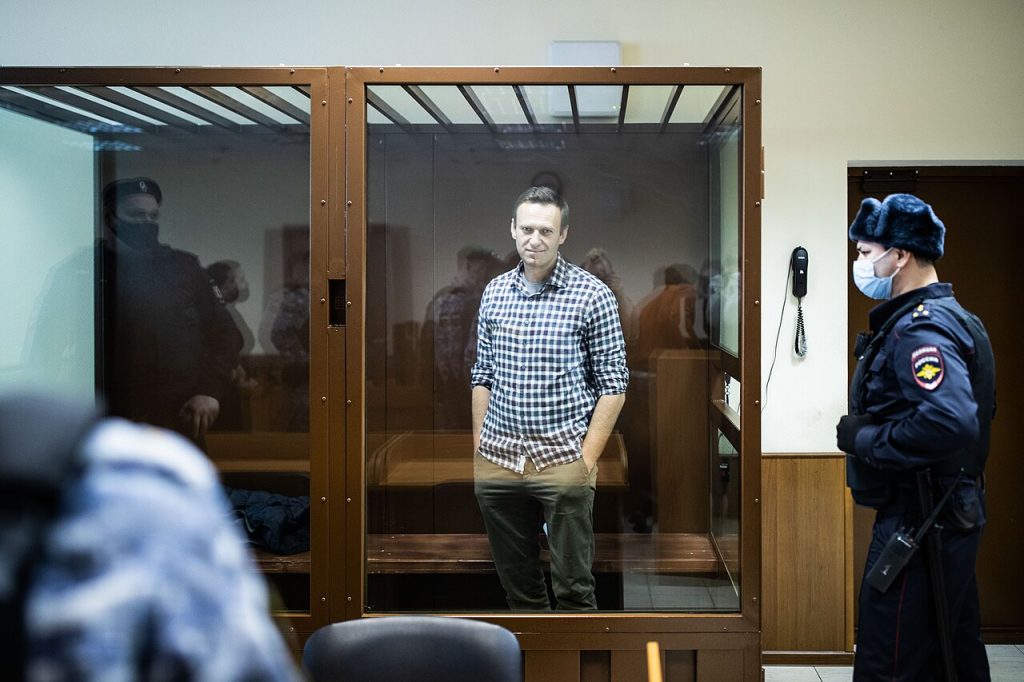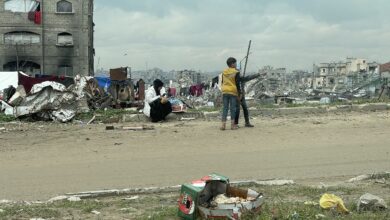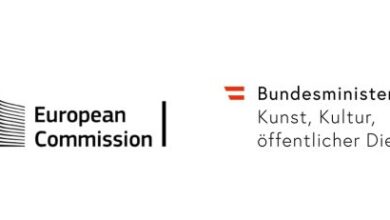
1.
Today, to talk about the future of Russia is like talking about life after death. Russia is in the midst of catastrophe, and horror grips us when we think of what Russia has already done, or what our compatriots have done in Ukraine in Russia’s name.
I have two pictures saved on my Facebook page which I always see when I open it. One shows a very young woman feeding her approximately one-year-old daughter from a bottle. This photo became famous after both were killed when a Russian missile hit their house. In the other, a 40-year-old man is sitting in a cafe with friends, grimacing as he shows them some document. He was killed, too. That’s it, he’s not grimacing anymore.
The thought of hundreds of thousands killed, of peaceful prosperous lives destroyed, is horrifying. And when we think of individual tragedies, history doesn’t exist. It has no meaning from this perspective.

Alexei Navalny in court after his re-arrest in 2021. Image: Evgeny Feldman. Source: Wikimedia Commons
I have no doubt that Russia will have to answer for this. I am sure that we will not escape reckoning, although I do not know when and how it will happen. For me, it is not a matter of collective responsibility, but of collective karma.
2.
In the meantime, I believe we must avoid some pitfalls in thinking about how and why this war became possible, how it might end, and what might come afterwards. As is always the case during war, horror and anger force us to simplify reality. As if the radicalism of our thought can stop it. It is a very understandable reaction. But it is quite unproductive.
Many Russians, intellectuals and ordinary people alike, are today depressed. Terror and the consciousness of their helplessness makes them silent – makes silent those who are against the war and against the evil that has engulfed a large part of their country. They feel like an insignificant and helpless minority, and therefore cede the arena and influence to this evil. But this is precisely what despotism seeks – the consciousness of helplessness and silence. Autocracies seek to distort our perception of the real balance of power in society, in order to lower our willingness to resist. This is in their interests, but not ours.
It is in Putin’s interest to present the case that those who tortured and murdered people in Bucha and elsewhere are the real Russia and there is no other Russia at all. It is in his interest to present the case that in Russia democracy has not only failed, but is fundamentally impossible.
I want to talk about such simplifications, which are popular among intellectuals both in Russia and the West, but which deprive us of a solid foundation and make us weaker.
3.
First, Russia is not the only country to have experienced such a catastrophe, nor is it the only country to have waged an unjust war of conquest. For some countries, defeat in war turned out to be a turning point in their history. We can all recite the examples. This is an important reason why for us, for Russian intellectuals, the hope that Ukraine will withstand is a personal and deep feeling.
This explains why our desire for Russia’s defeat seems to us more patriotic than anti-patriotic. So, I want to say that this war is a catastrophe, but not the end of national history.
Second, if we talk about Russia as a social reality, there is no Russia as such, just as there is no West as such. It is an extreme simplification to think that Russia as a single entity is attacking Ukraine, Europe and the West. No, it is the forces of anti-modernization, and not only in Russia, that are attacking the European project, the possibility of its implementation in Ukraine, and its internal Russian projection.
Russia’s aggression towards Ukraine is at the same time aggression towards the ‘European’ within Russia, against Russian society’s own potential for modernization. In Putin’s view, the global historical goal of this war is Russia’s total break with the West, which he hopes will open the way to Russia’s radical de-westernization.
4.
So, there is a war-inspired temptation to draw simple borders and build simple schemes. To claim, for example, that Russia is an ancestral nest of despotism, a country where authoritarianism is organic and immanent. Or to insist that the democratic project in Russia has failed totally and that the nation has returned to the point from which it started thirty-five years ago.
Despite all the complexities, contradictions and distortions of the political process, the post-Soviet era has in fact been one of deep and multidimensional modernization for Russia in the economic, technological and social sense. Even the last decade – the 2010s, when Putin’s autocracy was gaining strength – saw the creation of powerful independent journalism, a large sector of non-governmental civil society organizations, and the emergence of a new political generation, which revealed itself with the protests of 2011–2012 and 2019–2020 and whose face became Alexei Navalny. It was all this that provoked the ultra-conservative counterattack and full-scale invasion of Ukraine, a tool of radical military revanchism. The war of conquest was intended to mobilize all the archaisms in Russia, so as to undermine the modernization efforts of the last decades. So far it has succeeded in doing so.
Russia’s intense modernization and westernization since the late 1980s has caused an acute internal social conflict. This is a conflict between modernizing Russia and its new political generation, on the one hand, and the forces of autocratic nationalism on the other. In political terms, democracy in Russia has collapsed because the forces of anti-modernization have turned out to be stronger. But this does not mean that the modernization potential accumulated before the current period has disappeared completely.
5.
Such an acute social conflict is not unprecedented, nor is it evidence that Russia is not suited for democracy. It could be compared to the era after the First World War, when in many countries European empires were replaced by immature republican regimes. Over the next 15 to 20 years, these unstable democracies (including the Austrian and German ones) were overrun by extreme rightwing forces, unleashing a major war in Europe. Did we have any reason in the early 1940s to suppose that democracy in Germany would be possible again? And yet…
In the 1990s, after 70 years of communist deep-freeze, Russia found itself in the first period of its republican history. Like in most other post-Soviet states, this was a time of political corruption, of a weak state without effective law enforcement, of an unstable and chaotic party system – and of the subsequent rise of nationalist revanchism and popular demand for ‘strong power’. The weakness of Russian democracy was exacerbated by the fact that Russia was also flooded with oil and gas revenues in 2000s and 2010s. These revenues led to the unbridled enrichment of the corrupt elite, which became the organizer and support of the conservative-nationalist revanche.
6.
But I would like to broaden the scope of our view still further. In a historical sense, Russia is part of a large European periphery, a territory that is not Europe, but for several centuries has been closely linked to it and greatly influenced by it. This periphery is not limited to Russia. Belonging to the Greater European Periphery are those countries and regions where there is an elite-driven, pro-European idea that finds itself in conflict and competition with other civilizational influences and social doctrines. The Balkans, partly Turkey, Ukraine, Belarus, Russia and even Transcaucasia can also be said to belong to this zone.
In fact, if we look back, we find that the borderline defining the arena of the European project has been moving constantly. From Voltaire’s perspective in the mid-18th century, the rays of European enlightenment had only just begun to penetrate the German lands. For him, Europe was settled in the triangle between Paris, London and Amsterdam. In turn, the people of Vienna know well the famous bon mot of chancellor Metternich, spoken 50 years later at the beginning of the 19th century, that ‘Asia begins on Landstraße’. What Metternich meant was that, moving eastwards from the centre of Vienna, one very quickly finds oneself in a space that can hardly be seen as Europe.
Moving in the direction indicated by Metternich, one can today still find signs of the European periphery and clues of the unfinished struggle between European and non-European or even anti-European – for example, in Slovakia, Hungary and even Poland, even if the border of Europe has since moved much further to the east.
But in the next zone, from Russia and Belarus to Transcaucasia, Turkey and the Balkans, the struggle between the European and the anti-European is clearly visible and often takes dramatic if not tragic forms. At the same time, it would be short-sighted and wrong to consider the European aspirations of part of the elites and population of these territories as superficial, inorganic and accidental. Putin and other enemies of the European idea in these territories try to assure us of this. But the historical fact is different. For several centuries, these territories have felt the magnetism of Europe, which inspires their intellectual classes in their quest for modernization. From this perspective, these regions are an extension and another dimension of Europe.
We do not know how or when this rivalry in different parts of the Great European Periphery will end. But there is another important point – that as long as the pro-European ideas and forces in these countries remain influential, or at least do not become depressed or exhausted, they counter-balance anti-European forces and ensure peaceful coexistence between this periphery and Europe.
7.
This regular pendulum movement can be seen throughout Russian history – periods of pro-European modernization, followed by periods when the anti-European agenda is prevalent. The rapid adaptation of European models and practices is then replaced by hostility to the European ideal and efforts to replace it with Russia’s ‘national’ or even ‘civilizational’ identity.
The Bolshevik project in the twentieth century was probably the longest period of Russian anti-Europeanism. It was certainly the most extensive and bloody attempt to establish in Russia a system of institutions and values completely opposed to European ones. However, after the Soviet regime entered the phase of its demobilization in 1960s, it was only a matter of decades before a pro-European elite had formed in the Soviet Union, leading to an anti-communist and pro-western revolution.
From the mid-1980s until about the mid-2000s, Russia rapidly adopted European models and practices, despite all the attendant difficulties. The consolidation of anti-European forces and agendas started in the late 2000s and intensified sharply in the mid-2010s. Among a part of the Russian population and elites, oil abundance formed habits of rent-seeking and corruption. The goal of economic self-sufficiency was once again reinforced by the idea of civilizational exclusiveness and the restoration of Russia’s ‘great power’ status.
In deep perspective, then, the anti-European mode we see in Russian politics today is no more natural and organic than its opposite. Both are constituent elements of Russian history. Breaking off economic ties with Europe so abruptly and maintaining hostility towards Europe at such a high degree would produce strains on society and very strict forms of authoritarian control. After some time, when this control proves too expensive, or for other economic or political factors, prevailing opinion will turn back in favour of Europe. And when this happens, the institutional experience of Russian democracy and the experience of modernization will play an important role in this new period of Russian pro-Europeanism.
8.
I would like to draw your attention to one more regularity in the swings of Russia’s ‘European pendulum’. Periods of pro-European orientation in Russia often coincide with – and are stimulated by – signs of the success of Europe and the European project. Conversely, disillusionment with Europe and the prevalence of anti-European forces in Russia coincide with periods of crisis, instability and hesitation within Europe itself. In Europe, the mid-twentieth century was an era of brutal wars, unstable republics and emergent nationalism. But in the Soviet Union, it was one of intense construction of a totalitarian alternative to the European project.
Conversely, when Europe reached a trajectory of sustainable growth at the end of the twentieth century, democratizing citizens’ access to the benefits of this growth by creating a mass consumer society, while at the same time making a breakthrough in European integration, it provoked the crisis and collapse of the totalitarian anti-European empire in the East.
This is another reason why we can say that both Russian and Ukrainian history in recent centuries is part of European history. The fading of Europe’s ‘soft power’ contributes to the consolidation of anti-European revanchism in the zone of the Big European Periphery, and vice versa. Nowadays we see the European project attacked from outside and from within, its ‘soft power’ diminishing, its security weakening.
9.
It is very difficult to be the advocate of Russia against the backdrop of the horrors of Russian aggression. My aim is not to acquit Russians in any sense, but to emphasize that the war against Ukraine and Ukraine’s pro-European choice reflects the fight on the same issue within Russia itself. That is why opposition to it so important within and outside Russia. The view of Russia as an evil empire, and the view of the history of the liberal and pro-European project in Russia as a total failure – in other words, the mental radical separation of Russia from Europe – is what makes anti-war and pro-European people in Russia feel like a helpless minority.
And that’s what Putin wants. This is what enables his temporary success. But it is only part of what we’re being told to accept as the ultimate truth.
This text was the keynote speech at the Literatur im Herbst Festival 2023, ‘The other Russia’
Source link




